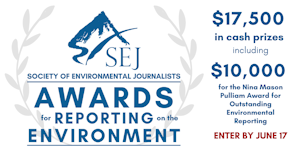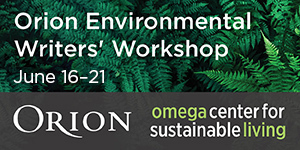Find fellowships, conferences, grants and awards deadlines, workshops and networking opportunities, crowd-sourced leads to job banks, reporting toolkits, hundreds of MOOCs and more. GO >>
Webinar: Chemical Recycling — It’s Not What You Think It Is
Public and government scrutiny of plastics recycling has grown tremendously over the last few years. Several major news outlets have run investigations into the effectiveness of recycling efforts; and in late 2022, the FTC announced that it would be soliciting comments for its Green Guides, with many organizations, including Ocean Conservancy, recommending greater regulation and transparency around companies’ recyclability claims. Earlier this year, the EPA released a draft National Strategy to Prevent Plastic Pollution, which specifically recommended “Review plastic resin identification codes to determine if changes are needed to reduce confusion around the recyclability of plastic products.”
Meanwhile, the environmental impacts of the plastics recycling crisis are significant. An analysis of 35 years of data from Ocean Conservancy’s International Coastal Cleanup shows that approximately 70% of the most commonly collected trash from beaches and waterways worldwide are effectively unrecyclable.These include items like plastic foam cups, plates, and takeout containers, all of which bear the chasing arrows symbol but which cannot be recycled – and which, according to a recent Ocean Conservancy report, more than half of Americans regularly try to place in curbside recycling bins.
In response, the fossil fuel and related petrochemical industries are doubling down on efforts to sell “chemical recycling” as a solution to the plastic pollution and recycling crisis (see examples from Shell and Exxon).
Ocean Conservancy invites members of the media and the public to join an hour-long discussion and Q&A session on chemical recycling at 11 AM PT/2 PM ET on Wednesday, October 18. The event will feature brief presentations from Dr. Anja Brandon, Ocean Conservancy’s Associate Director of U.S. Plastics Policy and an environmental engineer who has studied novels ways of breaking down plastics; Jessica Roff, U.S. & Canada Regional Plastics & Petrochemicals Program Manager at GAIA (Global Alliance for Incinerator Alternatives); and Lynn Hoffman, Co-President of Eureka Recycling.
Register here.
ABOUT THE PANELISTS
Dr. Anja Brandon is the Associate Director of U.S. Plastics Policy at Ocean Conservancy working to advance policy solutions at the state and federal level to eliminate plastic pollution and support the transition to a circular economy. Most recently Anja was part of the team of environmental advocates that helped draft and pass the strongest plastics legislation in the country, SB 54 in California, for which she was named among Fast Company’s Most Creative People in Business 2023. Dr. Brandon has been an invited speaker and lecturer on plastics policy and her scientific work at national and international conferences and at universities including Stanford, Oregon State University, and Bennington College. Prior to joining Ocean Conservancy, Anja was the AGU/AAAS Congressional Science Fellow in the office of U.S. Senator Jeff Merkley (D-OR), where she was the lead policy advisor on issues including plastics, ocean and water pollution, and toxic pollutants. Anja holds a Ph.D. in Environmental Engineering and Science from Stanford University where she was awarded an NSF Graduate Research Fellowship for her work. Her doctoral research focused on understanding plastic waste management challenges and developing novel methods to break down common plastics.
Jessica Roff has been fighting for more than fourteen years against climate change and for a sustainable, just energy system, working to stop fossil fuel extraction and infrastructure buildout and supporting front line struggles. Prior to her work in the climate movement, Jessica practiced law for a decade focusing on civil rights and Federal Indian law. She is based in so-called Brooklyn (occupied Lanape/Munsee/Canarsie lands) where she was born and raised.
Lynn Hoffman is a Co-President of Eureka Recycling, a 501(c)(3) nonprofit social enterprise with a Zero Waste mission based in the Twin Cities of Minnesota, and the National Coordinator for AMBR (the Alliance of Mission-Based Recyclers). Servicing the cities of Minneapolis and St. Paul and surrounding communities, Eureka operates a collection fleet and 100,000-tons-per-year single stream Material Recovery Facility (MRF) with a mission-driven, triple-bottom-line approach that balances environmental, social and economic benefit. Eureka’s mission is to demonstrate that waste is preventable, but they are also revealing where and why waste is currently inevitable, and how the rules and governing policies need to change in order to build a just, circular, and regenerative economy. From congressional testimony to community-based projects, Lynn has spent the last 20 years working with grassroots organizations, companies, and governments to advise, strategize, and implement authentic recycling, plastics reduction, and Zero Waste policy and program solutions.
ABOUT OCEAN CONSERVANCY
Ocean Conservancy is working to protect the ocean from today’s greatest global challenges. Together with our partners, we create evidence-based solutions for a healthy ocean and the wildlife and communities that depend on it. For more information, visit oceanconservancy.org, or follow us on Facebook, Twitter or Instagram.












 Advertisement
Advertisement 



